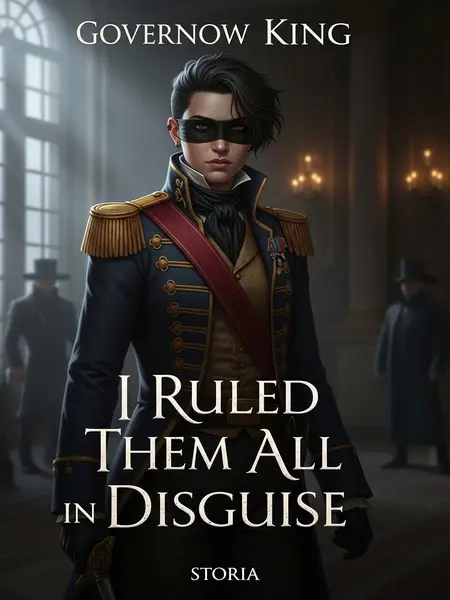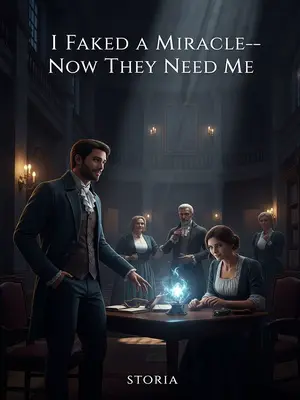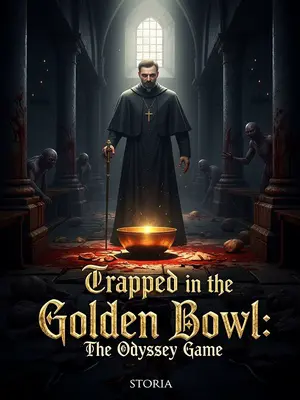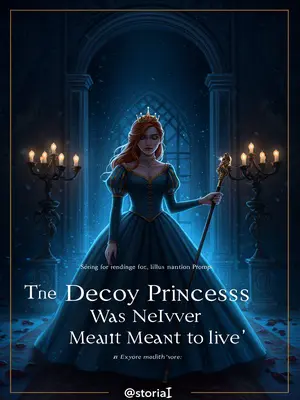Chapter 1: The Shadow King’s Secret
Ever since I was a kid, I’ve been passing for a boy—landed myself a job as a page in the governor’s mansion, of all places.
It was a hell of a gamble, honestly. I’d pull on my brother’s beat-up baseball cap, tuck all my hair up, and do my best impression of a scrappy street kid. Slipped right past those big white columns and into a world I’d only ever gawked at from the sidewalk. The marble floors echoed with my nervous footsteps. I nearly tripped over my own feet, but I kept my chin up. Truth is, folks never suspect the bold ones.
Thanks to my childhood friendship with Harrison Whitmore—who’d go on to be Governor—I worked my way up to become Harrison’s right-hand, the one he trusted most.
We’d grown up tossing rocks in the same muddy creek, daring each other to climb the tallest oak on the edge of town. Harrison was always the quiet one, but when he looked at you, it made you feel like you mattered. When he called me by my fake name and winked—well, that was all the reassurance I needed. And in the governor’s mansion, trust is worth more than gold.
Back then, life in the mansion was tough. But now, with my boss’s power behind me, I finally had the chance to even the score.
Funny how the tables turn. I used to scrub floors until my knuckles bled, but now, with Harrison’s shadow behind me, I could walk those halls with my head high. The folks who used to shove me aside now stepped out of my way, eyes down.
There’s a certain satisfaction in that, I won’t lie.
I took down rivals, ran all the important business, and at that time, people called me the “Shadow King.” Even the church ladies would curse my name at town meetings.
You know you’ve made it when the town gossips mutter your nickname under their breath, like you’re some boogeyman for grown-ups. My name? Whispered in grocery stores. In the pews after Sunday service. Even by the mayor’s wife when she thought no one was listening. “Shadow King”—I wore it like armor.
I swore that sooner or later, I’d get rid of them all! And I meant it.
Revenge is a dish best served with sweet tea and a side of grits, at least that’s how I saw it. I’d make sure every last one of them got what was coming.
Years later, it’s almost funny, watching those high-and-mighty types squirm. You’d think they’d never seen a woman with a backbone before. Senator, why are you blushing?
The senator’s face goes redder than a Georgia peach in July. I try not to laugh, but it’s hard.
General—what’s with the averted eyes?
The general, tough as nails on the outside, suddenly can’t meet my eyes. Folks like him are used to barking orders, not answering to someone like me.
Governor, don’t go tugging at my sleeve now.
And Harrison—Governor Whitmore himself—he gets all fidgety, tugging at my sleeve like we’re still kids playing hide-and-seek. Some things never change.
But before all that power, before the mansion—there was this one day. The day they were supposed to take my brother to the hospital for the operation, he doubled over with stomach pain, rolling around on the bed.
I remember the smell of antiseptic, the way the sheets stuck to his sweaty skin. He groaned and clutched his belly, eyes wild with fear. The whole house felt like it was holding its breath.
But our family had already taken the money, so someone had to go.
It’s funny, the way money changes things. My parents counted the bills twice, then looked at me like I was just another piece of furniture they could move around.
My parents dressed me in my brother’s old jeans and shoved me out the door.
Those jeans were two sizes too big, patched at the knees, smelling faintly of motor oil and grass. My mom barely looked at me as she tugged the cap down over my ears, and my dad just muttered something about making sure I didn’t screw it up.
Twins always look alike, after all.
People say twins have a sixth sense, but all I felt was cold as I stepped onto the porch. My brother watched from the window, guilt written all over his face. I gave him a quick nod—no hard feelings. At least, not yet.
So I just blended in with the other kids being taken away.
We shuffled down the hospital hallway, a sad parade of scared faces and trembling hands. The lights buzzed overhead, making everything feel unreal.
The one who was supposed to do the deed was a confused old orderly. I smeared a little pig’s blood on my jeans and screamed bloody murder. While his eyes were half-closed, I slipped into the group that had already had the procedure.
The orderly looked like he hadn’t slept in days. I smeared that pig’s blood—sticky, dark, reeking—right where it’d show. My scream echoed down the hall, sharp and desperate. In the confusion, I ducked behind a curtain and joined the other kids, hoping no one would notice one more teary face.
Everyone was bawling. I opened my eyes wide, looked at the sea of misery among the freshly-made little patients, and wailed like my life depended on it.
The sound was a chorus of heartbreak—kids clutching at blankets, some rocking, some just staring blankly at the wall. I let out a wail that could wake the dead. No one questioned it.
Misery loves company.
After the wailing, someone came by with food: a bucket of steaming oatmeal and a bucket of dark pig’s blood soup—yeah, you heard right, pig’s blood soup.
The smell hit me first—oatmeal, warm and sweet, and that other bucket, thick and metallic. My stomach twisted. The nurse handed out bowls, not bothering to make eye contact.
His voice was raspy, like he’d smoked a pack a day since Eisenhower was president. He grinned, showing yellowed teeth, and ladled out the soup like it was some kind of prize.
That didn’t make sense. Losing your manhood doesn’t mean you should eat pig parts! Seriously? Pig parts? Give me a break.
I couldn’t help myself. "Ain’t that for something else?" I piped up, earning a few snickers from the braver kids. The orderly just cackled.
He plopped the bowl in front of me, the soup sloshing over the edge. "You’ll get used to it," he said, like it was just another day at the office.
Sometimes it’s easier to play along than argue. I gave him my best blank stare and nodded, just like my brother would’ve.
Truth was, I’d never felt like I belonged anywhere. Maybe that’s why slipping into someone else’s shoes came so easy.
Inside, I wanted to laugh. Joke’s on them—I never had that so-called "root" to lose.
I looked around at the other kids, thinking, "Honestly, y’all are making a fuss over nothing." For girls, life’s always been about making do with what you’ve got.
If I could, I’d send up a prayer—"Lord, next time, just skip the whole mess. Let everyone start out the same and save us all a heap of pain."
One morning, I woke up to an empty house. No note, no goodbye—just a pile of dirty dishes and the faint smell of my dad’s aftershave. Turns out, money talks louder than family.
Gossip travels fast in a small town. Folks whispered about "that Rivers girl," saying it was a disgrace. Funny how shame only seems to matter when it’s convenient.
I’d ask myself that on cold nights, curled up in my tiny attic room. Hypocrisy tastes bitter, but you learn to swallow it.
It wasn’t out of love, not really. More like unfinished business. I wanted to see their faces when they realized just how far I’d come.
They arrived in their Sunday best, all fake smiles and open hands. My brother even slicked his hair back, trying to look respectable.
My mom’s voice trembled, but her eyes darted around the fancy parlor, already calculating how much the furniture was worth.
I kept my voice soft, but my heart hammered in my chest. I wanted to hear them say it out loud.
He sniffled, but his words landed like stones. I caught the way his eyes lingered on the silver tea set by my elbow.
The realization hit me all at once. They’d gambled on me, sure I’d come out on top.
I guess I should’ve been flattered.
Survival was the one thing I was good at. I’d been proving it since the day I was born.
They rattled off their wish list like they were ordering at a drive-thru. It was almost impressive.
Time softens even the sharpest edges. Some nights, I’d think about forgiving them—maybe even helping them out.
Funny, how it always circles back to that. The thing everyone’s so desperate to keep or get rid of.
I almost pitied them. Almost.
Kindness, in my book, means fairness. And what’s fair is fair.
It was only right. If I had to go through it, so should they. I made the call myself, voice cool as ice.
Their faces went pale as sheets. I couldn’t help but laugh—a deep, belly-shaking laugh that echoed off the walls. "Now we’re really in this together, aren’t we?"
I’d heard worse from drunks in the alley behind the mansion. Their words bounced right off me.
I could make or break a man’s day with a word. Power tastes sweeter than any dessert I ever stole from the kitchen.
Some folks look down on us, but I know better. Pages see everything, hear everything. We’re the real movers and shakers.
I wouldn’t trade it for anything—not even for my real name back.
People whisper that I’m strange, but I’ve always known I don’t fit the mold.
That’s my secret weapon.
I was born with sharp edges. The mansion just gave me a place to use them.
I remember my first night—cold, hungry, and determined. The world felt too big, but I refused to shrink.
The guesthouse was a forgotten corner, the kind of place where dust gathers and hope goes to die. Mrs. Yates lay bundled in thin blankets, her cough rattling the windowpanes. Harrison, skinny as a rail, sat beside her, eyes wide and wary.
Hannah tried her best, but she was in over her head. Her hands shook as she poured tea, and she flinched at every loud noise.
I tried to sound gentle, but I was already scanning the room for anything worth salvaging. She smiled weakly, grateful for the smallest kindness.
The quilt crunched under my hand, brittle and useless. My breath fogged in the air—it was colder inside than out. Lying down would just freeze her solid.
Her voice broke, and I could see the fear in her eyes. She clung to the hope that someone, anyone, would fix things.
She tried to sit up, but the effort left her gasping. I felt a flicker of anger—how could she worry about others when she was freezing?
It made no sense to me. Charity starts at home, doesn’t it?
I forced a smile, promising to make things better. She nodded, trusting me more than she should have.
The flames caught quick. The reeds turned to ash in seconds. The room filled with smoke and heat—a dangerous, reckless kind of warmth.
She was dumbfounded, watching in horror as the flames licked the reeds. I spun around, grinning like a kid at a bonfire. For a moment, I forgot the cold.
Her mouth hung open, eyes wide. I shrugged—sometimes, crazy gets things done.
Sparks danced up the chimney, and the room glowed orange. The fire was alive, crackling and spitting.
It was reckless, sure, but desperate times call for desperate measures. I felt alive for the first time in weeks.
Harrison tried to tackle me, but he barely weighed more than a sack of flour. I shoved him aside.
Not unkindly, just firm.
Their cries were soft, muffled by years of keeping their heads down. Harrison glared at me, fists clenched, but I could see the fear in his eyes.
The air was thick with resignation. It made my skin crawl.
The pounding grew louder, voices rising in panic. I stood my ground, daring anyone to break down the door.
Showtime.
My knees hit the floor hard. I let the tears flow, loud and messy. Sometimes, drama gets results.
The head housekeeper’s voice cracked like a whip. I flinched, but didn’t back down.
Steam hissed as the flames died. The room smelled of wet ash and burnt reeds.
I clutched at Mrs. Whitmore’s skirt, voice trembling like I was about to faint. I’d learned early that guilt trips worked wonders on the rich.
She looked around, surprised to see life in this forgotten wing. I could tell she hadn’t set foot here in years.
They looked so small, so fragile. My heart ached, just a little.
I gestured to them, making sure Mrs. Whitmore saw the shivering child at her feet.
She sighed, rubbing her temples. It was clear she had more problems than she could count.
The gossip was everywhere—Mr. Whitmore and his wandering eye. Mrs. Whitmore just tried to keep the peace.
Even in a house full of secrets, this crossed a line. Mrs. Whitmore’s lips pressed into a thin line.
Her judgment was swift. I could live with that—three months’ pay was a small price for survival.
Her voice was cool, but the warning was clear. The staff shifted uncomfortably.
The kitchen sent over hot stew, thick blankets, and real bedsheets. For the first time in months, the guesthouse felt like home.
She reached out, her hand trembling, but her eyes kind. I swallowed hard, suddenly shy.
I picked the name out of thin air, but it sounded strong—like someone who couldn’t be pushed around.
Mr. Rivers had taught me to read when no one else bothered. I figured the name might bring me luck.
Amy felt small, forgettable. Jamie was sharp, quick—just the way I wanted to be.
What did a last name matter, anyway? In this world, you made your own luck.
No one was lining up to marry me off. I could be whoever I wanted.
It became a game for me, collecting names like baseball cards. Some days I was Jamie Rivers, others I was someone else entirely.
Her words stuck with me. She’d read enough to know that envy never filled a belly.
I’d met plenty of women who could cook or sew, but few who quoted poetry. Mrs. Yates was different.
He licked crumbs from his lips, genuine curiosity shining in his eyes. I grinned, feeling a little proud.
It was a lesson I’d learned young: make noise, and someone will pay attention.
I’d watch him get the drumstick while I gnawed on the wing. It wasn’t fair, but it was the way things were.
I was a champion tantrum-thrower. My wails could shatter glass—or at least my dad’s patience.
He’d shake his head, but hand over the food anyway. I took what I could get.
My brother would sit there, smug as can be. I wanted to smack the look off his face.
He got everything handed to him. Easy to be noble when you’re never hungry.
He learned quick. After a while, he started hiding treats, but I always found them.
Desperate times, desperate measures. I wasn’t above a little arson if it meant survival.
It was pure self-preservation. The weak protect the weak, because no one else will.
She clung to her pride, even as her hands shook from hunger. I never understood it.
That was my motto. You can’t eat dignity.
Books were for people with full bellies. I had other things to worry about.
They’d sneer at my accent, my rough manners. I’d just smile and nod, knowing I’d outlast them all.
It became my private joke—anyone who crossed me was out on their ear.
Funny how respect comes easy when you’re holding all the cards. Their flattery was as fake as their smiles.
I let my words hang in the air, savoring their discomfort. My raccoon—rescued from a trap in the garden—purred in my lap.
I wrinkled my nose as the smell hit me. Some men just aren’t built for pressure.
My staff hustled them out, not bothering to hide their grins. Justice, mansion-style.
If I never have to deal with another pompous know-it-all, it’ll be too soon.
I learned quick that you can’t count on charity. If you want something done, you do it yourself.
But they never did. Too proud, too quiet. I guess everyone’s got their own way of surviving.
Hannah would rather starve than beg. I admired her stubbornness, even if it was foolish.
Shamelessness was my superpower. I wore it like a badge.
My voice rang out, echoing down the hallways. Heads popped out of doors, curious and a little afraid.
My mom always said I could wake the dead with my crying. I put that talent to good use.
The staff caved, shoving coins into my palm just to shut me up. I winked at Hannah as I handed over the goods.
Victory tastes sweet—almost as sweet as the cookies I’d sneak from the kitchen.
He was quiet, but steady. The kind of kid who’d give you the last piece of bread without a word.
I’d learned to move like a shadow, slipping in and out of rooms without being seen. The extra bits I pocketed kept us all fed.
We made a game of it—who could catch the fattest sparrow, who could outrun the cook’s broom. Those afternoons, we almost felt like normal kids.
We made do with what we had. Hunger was a constant companion, but we learned to ignore it.
No matter what I tried, nothing helped. The room smelled of stale herbs and desperation.
He paced the room, biting his nails. I pulled him aside, whispering my plan in his ear.
The sun beat down on us, sweat trickling down our backs. My knees ached, but I stayed put.
He was a statue, but I fidgeted, shifting from side to side. The guards looked at us like we were crazy.
Judge Everett’s arrival was a surprise. He was tall, stern, with a face like carved stone. Lucas, by his side, looked bored.
His voice was deep, commanding. Harrison looked up, eyes wide, then quickly dropped his gaze.
I nudged him, but he just stared at the floor, lost in thought.
My words were soft, meant only for Harrison. He nodded, swallowing hard.
His voice was steady, stronger than I expected. Judge Everett looked impressed.
He tapped his cane, waiting for an answer. Harrison hesitated, glancing at me.
His words were barely above a whisper. Judge Everett’s eyes softened, just a little.
He motioned for Harrison to follow, leaving me standing awkwardly in the sun.
Lucas’s shoes shone like mirrors. I wondered if he’d ever gotten them dirty.
Rumor had it Lucas’s family tipped big. My stomach rumbled at the thought.
I tried my best to sound friendly. Maybe he’d take pity on me.
His nose wrinkled, as if the very idea offended him. I bit back a sigh.
Maybe I could get him talking, loosen him up.
His words stung. I blinked, caught off guard by his sharp tone.
No one had ever scolded me like that before—not even the head cook.
I’d always gotten by on charm. Lucas was immune.
My pride prickled. I forced a smile, determined not to let him see me sweat.
If looks could kill, Lucas would’ve dropped on the spot.
Some rivalries are born in an instant. Ours would last a lifetime.
The hallway was quiet, the air heavy with the smell of old books and lemon polish.
My stomach growled. The cookies looked fresh, the apples shiny and red.
I eyed the food like a starving wolf. No one would miss a few cookies, right?
Quick hands, quicker feet. I was a master at not getting caught.
The words sent a jolt of panic through me. I froze, cookies halfway to my mouth.
I ducked behind a potted plant, holding my breath until the coast was clear.
He came out pale, hands shaking. I gave him a reassuring nod.
The tension in the air was thick enough to cut with a knife.
Harrison bowed in thanks, and I quickly followed suit.
I copied his movements, trying to look as proper as possible.
They bounced across the floor, landing at Lucas’s feet. My face burned.
I mumbled an apology, hoping no one noticed.
His voice dripped with contempt. I bristled, but bit my tongue.
I wanted to shout it, but I kept my mouth shut. No sense making enemies I didn’t have to.
His knees buckled, and I caught him before he fell.
He hesitated, but hunger won out. He took a bite, eyes closing in relief.
Most kids would’ve fainted. Harrison was tougher than he looked.
I waved the cleanest cookie in front of his nose. He smiled, just a little.
He always made sure I got my share. I liked that about him.
The crumbs stuck to my lips, but I didn’t care. For a moment, everything felt right.
His smile was rare, but when it came, it lit up the whole room.
He’d wait until the others left, then pounce.
I shot back, refusing to back down. Harrison hid a smile behind his hand.
It became a game—who could get the last word. I usually won.
He loomed over me, arms crossed. I didn’t flinch.
My tone was sweet as honey, but my eyes dared him to push me.
He sounded like a teacher scolding a kindergartner. I bit back a laugh.
I played innocent, tilting my head.
His nose wrinkled, as if the very idea offended him.
I shrugged, as if I was doing everyone a favor.
His words were meant to sting, but I let them roll off my back.
He was everything I wasn’t—and I was proud of it.
The look on his face was priceless. Harrison burst out laughing, the sound echoing off the walls.
The whole mansion buzzed with gossip. Bets were placed, alliances formed and broken.
We stayed out of the way, heads down, ears open. The less noticed, the better.
Harrison was the underdog, and everyone knew it.
Her death was quiet, almost peaceful. The world kept turning.
Her grip was surprisingly strong. I nodded, tears pricking my eyes.
I meant it. I’d protect Harrison with my life if I had to.
He stood like a statue, face blank. I worried about him.
I put a hand on his shoulder, gentle as I could. He shook his head.
His words were flat, emotionless. I knew he was hurting, even if he couldn’t show it.
I tried to distract him, give him something else to focus on.
The house was tense, everyone on edge. No one knew who’d be next.
I kept my ears open, picking up gossip and secrets wherever I could.
We were the eyes and ears of the mansion, slipping through cracks no one else could see.
We carried news, favors, and sometimes secrets from one end of the mansion to the other.
Sometimes, the stories were better than any novel. I collected them like treasures.
I could piece together a story from the smallest clue. People came to me when they needed answers.
Will was always the first with news. He’d sidle up to me, voice low, eyes darting.
It sounded random, but I knew what I was talking about.
They leaned in, hungry for gossip.
Their eyes widened. The pieces started to fit together.
I laid it all out, watching their jaws drop.
It’s like unraveling a sweater—pull one string, and the whole thing comes undone.
Some folks have a nose for trouble. I had a nose for secrets.
People started calling me “the Fixer” behind my back. I liked it.
I became the unofficial counselor of the mansion. Even the head cook asked my advice sometimes.
There was always one skeptic in the crowd. I just shrugged.
Their laughter was good-natured. I rolled my eyes, playing along.
We learned to let go of pride. Survival mattered more than ego.
My words drew a few nods, a few snickers. But they knew I meant it.
I grinned, soaking up the praise. It felt good to be respected, even if it was for the wrong reasons.
I winked, making them laugh.
I let the words hang, daring anyone to question me.
He grinned, slapping me on the back. I forced a smile, hiding my annoyance.
I wanted to yell, but I bit my tongue. Some battles aren’t worth fighting.
It became a running joke. I learned to laugh along.
Life has a funny way of rewarding patience.
He kept his head down, focused on what mattered. It drove the others crazy.
The judge became a mentor, teaching him things no one else could.
Perks of the job. I never let an opportunity pass me by.
The air crackled with tension. Everyone watched, waiting for the next move.
Her entrance was grand, her perfume lingering long after she left. I straightened my jacket, ready for inspection.
I watched the others collect their tips, envy burning in my chest.
Or so she wanted everyone to believe. I knew better.
The look was sharp, a silent warning. I braced myself.
I kept my tone respectful, hoping to avoid trouble.
Her words cut deep. I kept my face blank, refusing to give her the satisfaction.
Her smile was cruel. I felt my stomach drop.
I couldn’t believe what I was hearing. My heart pounded in my chest.
He stood tall, voice steady. I wanted to hug him and shake him at the same time.
The kick was more for show than pain, but I yelped anyway, playing my part.
Her voice dripped with malice. I braced myself for the worst.
Maybe, just maybe, she’d let us off easy.
My heart sank. I closed my eyes, ready for the pain. But inside, I promised myself—one day, I’d make her regret this. One day, I’d be the one giving orders, and she’d be the one begging for mercy.













